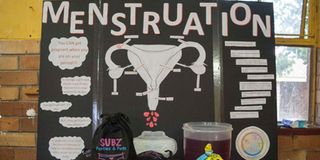Menstrual health, hygiene are key to SDG 5, Vision 2030

A poster used to educate girls about menstruation and female reproductive system.
What you need to know:
- The use of unhygienic materials such as torn pieces of cloth, mattress sponge, animal skin, or rags as a means to manage menstrual flow is still common.
- This can lead to leakage, infections, psychological discomfort, culminating in poor performance and stigmatisation.
Menstrual Hygiene Day is observed every May 28, coinciding with the International Day of Action for Women’s Health. It highlights the importance of menstrual care and raises awareness of the social issues women face during and due to menstruation.
This year’s theme is “To create a world where no women or girl is held back because they menstruate, by 2030” . Kenyans are mulling over the selection of the first female presidential running mate with the hope that, should she win, that will bring reforms that will favour girls and women issues.
Menstrual poverty is still abject in most parts of the country. The use of unhygienic materials such as torn pieces of cloth, mattress sponge, animal skin, rags or leaves or digging a hole on the ground to sit on for the whole period as a means to manage menstrual flow is still common. This can lead to leakage, infections, psychological discomfort, culminating in poor performance and stigmatisation.
Studies show 65 per cent of Kenyan women and girls cannot afford basic sanitary pads and often rely on men for the products. Some engage in transactional sex that results in a vicious cycle of perpetuated patriarchy of dependence and exploitation, increases HIV and STD risk and exposes adolescent and young women to unwanted pregnancies. Many girls miss school, averagely 4-5 days per month, for lack of sanitary pads and underwear and inadequate sanitary facilities in schools.
Factors such as gender inequality, discriminatory social norms, cultural taboos, poverty and lack of basic services often cause girls’ and women’s health and hygiene needs to go unmet, exacerbating their vulnerability. The menstrual predicament has also caused physical violence against women and girls.
Period products
In 2004, Kenya became the first country to remove tax on period products. In 2017, President Uhuru Kenyatta accented to a law requiring schools to provide free sanitary napkins to female students but that was botched by theft and poor distribution.
Increased access to sexual and reproductive health products can be attained through the mapping out of poor families in marginalised areas, informal settlements and rural areas. Appraise the school sanitary towel project to reduce the disproportionate dropout rates between boys and girls when transitioning into secondary schools.
Pragmatic and factual menstrual information should be provided to girls and young women. Awareness and openness about menstrual health and hygiene will empower them to manage the process without embarrassment or stigma and demystify it. A public-private partnership can expand the financial and sanitary towel base. The prices of towels can be reduced to beat the high inflation.
Access to good menstrual health and hygiene products is key to supporting SDG 5 by creating a more gender-equal society and ending extreme poverty and propagate the realisation of the Kenya Vision 2030 as more women will be roped in.
Ms Pamella is a communication and media technology student at Maseno University. [email protected].





